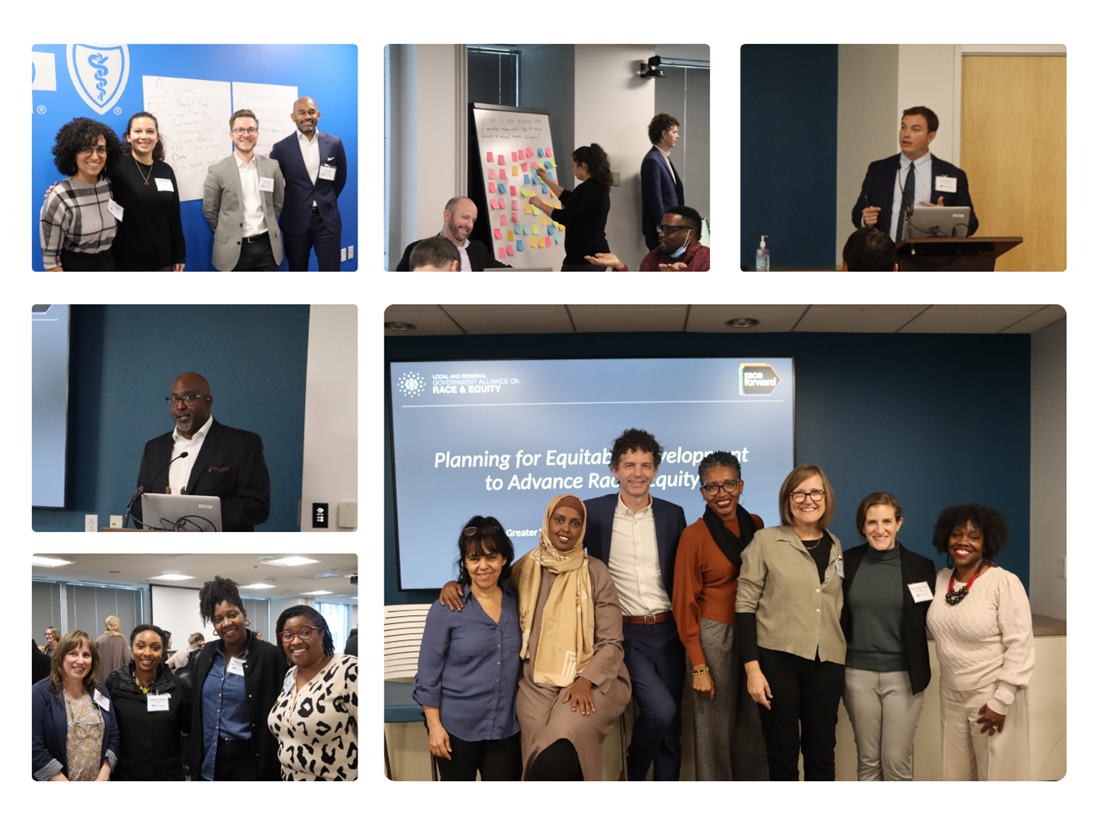On November 3, the Metropolitan Washington Council of Governments (COG), in partnership with Race Forward’s Government Alliance on Race & Equity (GARE), hosted Planning for Equitable Development, an event that brought together 80 local government racial equity officers, planning directors, and housing department directors. This cross-departmental gathering provided a platform for sharing a regional vision for equitable growth, prioritizing equity in local planning, and fostering collaborative relationships across jurisdictions. It also sought to lay the groundwork for developing regional guiding principles to advance racial equity through new policies and implementation of jurisdictions’ comprehensive plans.
The event commenced with introductory remarks from COG Executive Director Clark Mercer, Arlington County Chief Race and Equity Officer Samia Byrd, Race Forward’s Cathy Albisa, and former COG Board Chair and Arlington County Board Chair Christian Dorsey on the urgency for delivering equitable outcomes. Dorsey emphasized the significance of adopting guiding principles to ensure a multiplier effect that accelerates equitable development at the local level.
The first half of the event addressed local history and current day inequities to ensure the participants considered past harms when thinking about how to center equity in local comprehensive plans. Celina Barrios-Millner Co-Vice President of the Office of Race and Equity Research at the Urban Institute shared how people's well-being, health outcomes, and life expectancy in their communities are directly affected by geography and historical policies. Ubax Gardheere of Race Forward discussed historical and current inequities, underscoring the need for inter-agency collaboration and breaking down silos to cultivate vibrant neighborhoods where all residents can prosper. The presentations led to a group discussion in which practitioners discussed how to address past and present inequities to shape the future vision of equitable growth within their respective governments.

In the latter portion of the event, attendees gained insights into national best practices from Race Forward’s Housing, Land and Development Director Ryan Curren and heard from a panel of officials from COG’s Planning Directors Technical Advisory Committee discussing local best practices and equity integration into their local comprehensive plans. The conversation featured three perspectives on lessons learned from Montgomery County, Arlington County, and the District of Columbia. Arlington County Planning Director Anthony Fusarelli highlighted Arlington's Comprehensive Plan with a racial equity framework and described the role of the Missing Middle Housing Study in addressing land use and housing disparities. Sakina Khan, District of Columbia Deputy Planning Director, also discussed affordable housing and updates to DC’s comprehensive plan to ensure equity, affordability, and resiliency are top of mind when writing the new plan.
With a different viewpoint, Chief of Montgomery Planning Research and Strategic Projects Division, Carrie McCarthy expressed the process of creating the Montgomery County equity framework and the process of adopting principles with 60 staff members engaging in community engagement and 9 working groups. The discussion concluded with a consensus that achieving equity requires open and honest dialogues between planners, racial equity officers, housing directors, elected officials and the community to ensure alignment with community needs and goals.
The last phase of the event involved drafting regional principles for equitable development. Attendees were assigned to one of ten tables, each with a specific racial equity planning principle, where they collaborated to define the principle from a racial equity and planning perspective. The “Understand and respond to local context” principle garnered ample feedback, as practitioners had differing perspectives on what community preservation means and how to strengthen local assets and cultural resources as neighborhoods grow, with some noting how marginalized communities have faced challenges due to past design decisions.
When all the principles were thoroughly discussed, attendees shared key takeaways from the event, emphasizing the role of community engagement in meeting people where they are and identifying social and economic barriers to ensure practitioners can plan deliberately and inclusively.
To wrap up the event, Karla Bruce, Chief Equity Officer for Fairfax County, left attendees with thought-provoking questions for practitioners to consider when planning for equitable development: "Whose terms and for what purpose are we preserving? What kind of enhancements are we offering our communities?" She concluded her remarks by emphasizing that land use and planning is at the helm of advancing racial equity, and the cross-departmental relationships forged during the event will drive equitable development forward.
The draft regional equitable development principles will be shared with the COG Chief Equity Officers, Planning Directors, and Housing Directors committees. The final equity principles will be presented to the COG Board in Spring 2024 for consideration.